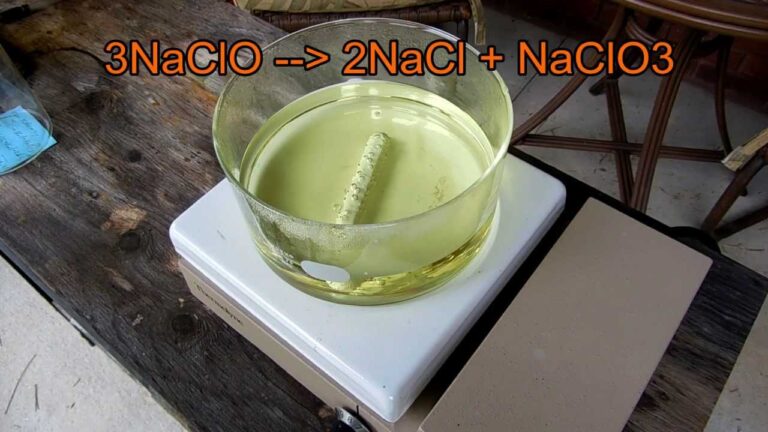Boiling Bleach: Unveiling the Surprising Consequences
18/09/2023

Boiling bleach may seem like an unconventional experiment, but it has become a hot topic of discussion among curious individuals. Bleach, a commonly used household disinfectant, contains sodium hypochlorite, a chemical compound known for its strong oxidizing properties. When subjected to high temperatures, such as boiling, bleach undergoes several chemical reactions that can have unexpected consequences. While some believe that boiling bleach can enhance its cleaning power or create a more potent disinfectant, experts advise against this practice due to the release of toxic fumes. In this article, we will delve into the science behind boiling bleach, exploring the potential dangers and consequences that arise from this experiment. By understanding the chemical reactions involved, we can gain valuable insights into the importance of using bleach safely and effectively.
Is it safe to boil bleach?
Boiling bleach should never be attempted as it can produce Chlorine Gas, an extremely hazardous byproduct. This gas is incredibly toxic and poses a severe risk to human health. Being heavier than air, it has the potential to fill the lungs upon inhalation, leading to suffocation. To ensure safety, it is crucial to refrain from boiling bleach and handle it responsibly, following proper guidelines for its intended use.
The risks associated with boiling bleach cannot be overstated. The production of Chlorine Gas, an extremely toxic byproduct, can occur and poses a severe threat to human health. Inhalation of this gas can lead to suffocation, making it crucial to handle bleach responsibly and avoid any attempts to boil it.
Does bleach undergo a reaction with boiling water?
Contrary to popular belief, bleach remains effective even when used with hot water. This is true for both chlorine-based bleaches and oxygenated bleaches. Whether you're using the liquid jugs or laundry boosters, such as Tide Whites + Brights Rescue, their effectiveness is not compromised by warm or hot water. So, there is no need to worry about bleach undergoing a reaction or losing its efficacy when mixed with boiling water.
Despite what many people think, bleach does not lose its effectiveness when used with hot water. Both chlorine-based and oxygenated bleaches, whether in liquid form or as laundry boosters, remain just as effective when mixed with warm or hot water. So, there is no need to be concerned about bleach reacting or losing its efficacy when combined with boiling water.
Is bleach destroyed by heat?
In the specialized field of bleach degradation, it is important to understand the impact of heat on its effectiveness. Exposure to heat and light provides the necessary energy for chlorine molecules to escape the solution and form a gaseous state, leading to bleach degradation. The higher the temperature, the faster this process occurs, making even a small increase of 10 degrees significant. Therefore, it is crucial to carefully control the temperature to maintain the effectiveness of bleach and maximize its utility in various applications.
Temperature control is crucial in the field of bleach degradation. Heat and light provide the energy needed for chlorine molecules to escape the solution, causing bleach degradation. Even a slight increase in temperature can significantly speed up this process. Therefore, understanding the impact of heat is vital to maintain bleach effectiveness and maximize its utility in various applications.
The Chemical Reaction Unveiled: Exploring the Consequences of Boiling Bleach
Boiling bleach, a commonly used household disinfectant, can have drastic consequences that are often underestimated. When bleach is heated, a chemical reaction occurs, producing chlorine gas, a highly toxic substance. Inhaling this gas can lead to severe respiratory problems, irritation of the eyes and throat, and in extreme cases, can even be fatal. Additionally, the heat can cause the bleach to break down into various compounds that can be harmful to the environment. It is crucial to be aware of the potentially dangerous effects of boiling bleach and to handle it with caution to ensure the safety of ourselves and our surroundings.
Overheating bleach can have serious consequences. The chemical reaction produces toxic chlorine gas, which can cause respiratory problems and be fatal. The breakdown of bleach compounds can also harm the environment. It is vital to handle bleach with caution to ensure safety.
From Household Cleaner to Hazardous Substance: Unraveling the Effects of Boiling Bleach
Boiling bleach, a common household cleaner, can have hazardous consequences. As bleach is heated, it undergoes a chemical reaction that releases toxic fumes known as chlorine gas. Inhalation of this gas can cause respiratory problems, eye irritation, and even severe health issues. Furthermore, boiling bleach can also generate a byproduct called chloramine, which can be equally harmful. It is crucial to be aware of these potential dangers and to follow safety precautions when using bleach, ensuring proper ventilation and avoiding the temptation to boil it.
It is important to note that boiling bleach, a common household cleaner, can be extremely hazardous. When heated, bleach undergoes a chemical reaction that releases toxic chlorine gas, causing respiratory problems and eye irritation. Additionally, boiling bleach can produce a harmful byproduct called chloramine. To ensure safety, it is crucial to be aware of these potential dangers, maintain proper ventilation, and avoid boiling bleach altogether.
In conclusion, boiling bleach can have severe consequences and should never be attempted. The process releases toxic fumes that can cause respiratory problems, eye irritation, and even chemical burns. The resulting mixture can also produce potentially harmful byproducts, such as chlorine gas. Moreover, boiling bleach can damage surfaces and objects due to its corrosive nature. It is important to handle bleach with caution and follow the manufacturer's instructions for safe use. If you need to disinfect or clean, it is recommended to dilute bleach in water and use it as directed. Remember, being mindful of the potential dangers of boiling bleach can help ensure the safety and well-being of yourself and those around you.
